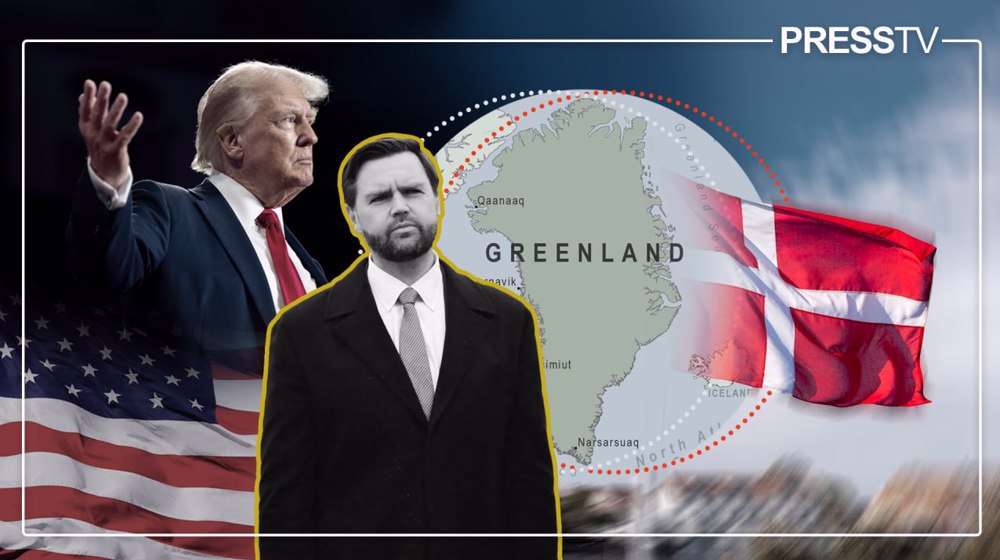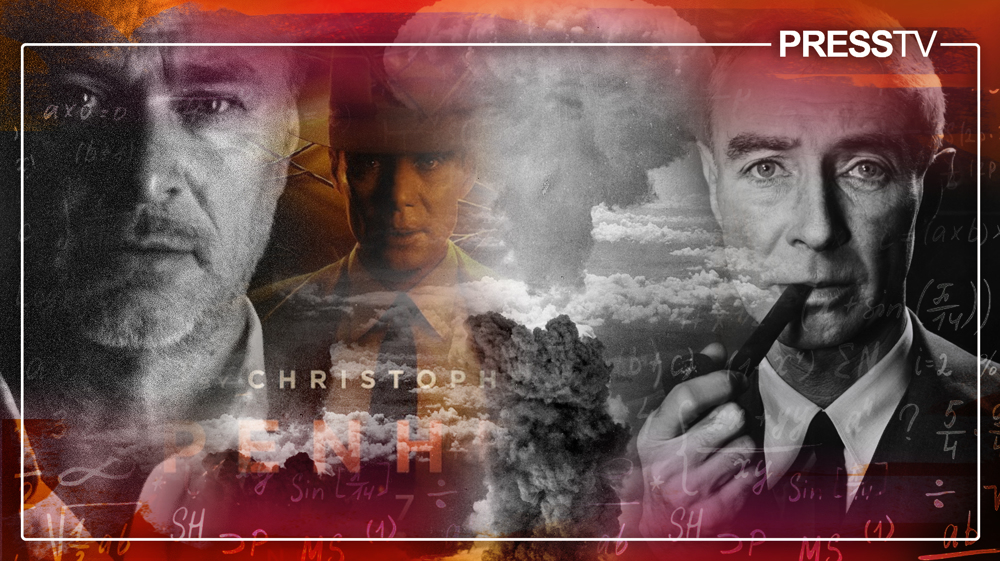‘Oppenheimer’, highest-grossing WWII biopic, distorts history to promote war
By Kit Klarenberg
Christopher Nolan’s much-anticipated latest film, Oppenheimer, an exhaustive biopic on the "father of the atomic bomb" J. Robert Oppenheimer, has shattered multiple box office records in recent weeks across the world.
A labyrinthine visual epic, it tells a tragic story of the American theoretical physicist's stratospheric rise to international fame as the architect behind the atomic bomb, and the unceremonious undoing once his creation’s terrifying detonation over Hiroshima and Nagasaki transformed him into an anti-nuke activist.
The movie has stoked significant controversy in Japan, for failing to adequately convey the catastrophic horror of the US attacks, and its heroic race-against-time, against-all-odds retelling of Washington’s covert crusade to harness the atom’s destructive power during World War II.
Moral dilemmas over nuclear weapons effectively emerge on-screen only when that apocalyptic quest is successfully completed, with stereotypical Hollywood swagger.
Even then, this turmoil manifests as a personal struggle between Oppenheimer’s professional detractors, and his own conscience.
Nonetheless, Oppenheimer does fleetingly touch upon a fundamental, little-considered paradox at the Manhattan Project’s core.
Once Nazi Germany surrendered in May 1945, its ostensible founding objective - routing Berlin’s own pursuit of nuclear weapons - was no longer relevant. By contrast, Imperial Japan’s nuclear program posed no threat.
It was embryonic, poorly funded, moving extremely slowly, and the military struggled to source the materials necessary to begin construction.
Yet, the Manhattan Project continued apace.
In the movie, Nazi Germany’s surrender is swiftly dealt with in a single scene. In it, some project scientists question whether the endeavor should be scuttled, but Oppenheimer summarily dismisses their concerns and demands they keep working, in order to end the war in the Pacific.
This is in every conceivable way a crass distortion of what actually happened at Los Alamos following Berlin’s capitulation.
The episode is however forensically explored at some length in American Prometheus, the biography upon which the film is based. Given the truth of these events, that the historical record was so egregiously corrupted is no mystery.
‘Fini Japs’
In reality, following Nazi Germany’s surrender, several Manhattan Project scientists demanded work cease immediately and lobbied aggressively to achieve that end.
Leo Szilard was the most viscerally opposed. In August 1939, he coauthored a letter to then-US President Franklin D. Roosevelt with Albert Einstein, warning Germany may develop atomic bombs, and encouraging the US to do the same.
This bold intervention led to the Project’s creation. The physicist now feared a post-war nuclear arms race between Washington and Moscow would destroy the world.
Oppenheimer himself had severe misgivings about the weapon’s usage in any context, let alone against civilian targets. He duly consulted numerous Manhattan Project friends and collaborators in private, asking whether they felt the effort should be ended.
One suggested inviting Japanese scientists to a nuclear test launch, believing the demonstration alone might spur Tokyo to cease hostilities in the Pacific.
Eventually, Oppenheimer resigned himself to the belief a nuclear strike was inevitable by this stage while rationalizing it would coerce Emperor Hirohito to surrender, therefore making an “inevitable” full-scale US invasion of Japan unnecessary, and potentially sparing millions of lives.
He also appears to have accepted the argument of his hero Niels Bohr that the bomb’s use could end wars forever, by making future conflicts impossible.
Furthermore, Oppenheimer's powerful elements of Washington’s military and political leadership were determined to use the bomb and couldn’t be persuaded otherwise.
What he didn’t know was that by the time of Nazi Germany’s surrender, US intelligence had intercepted and decoded multiple messages indicating Japan’s military chiefs believed the war was already lost and sought acceptable surrender terms.
Many high-ranking White House figures believed - or even knew for a fact - in the months leading up to the August 1945 nuclear attacks on Hiroshima and Nagasaki that political steps could be taken to end the Pacific war.
When General Dwight D. Eisenhower was told of the bomb’s existence at the Potsdam Conference in July of that year, he remarked “It wasn’t necessary to hit [the Japanese] with that awful thing” as they were ready to surrender.
At roughly the same time, then-US President Harry Truman recorded in his private diary having received an intercepted diplomatic cable, in which a Japanese envoy made clear to the Soviet leadership Hirohito was “asking for peace.”
This entreaty followed months of speculation that Moscow would declare war on Tokyo. Merely days later, Truman diarized how Joseph Stalin had confirmed to him he would do precisely that, on August 15th, 1945.
“Fini Japs when that comes about,” the President starkly appraised.
It is unsurprising then that Oppenheimer felt he’d been deliberately misled by the White House and Pentagon, once these concealed facts became public knowledge.
His post-war peace activism was directly informed not only by the devastating impact of the atomic bomb on innocent civilians but the grand deceit by which his acquiescence to their use had been secured.
Falsifying Reality
So the nuclear bombings of Hiroshima and Nagasaki went ahead on August 6th and 9th respectively, despite widespread cognizance that they were completely needless, and would slaughter vast numbers of civilians.
Between the two devastating bombings too, the Soviet Union invaded Manchuria and immediately began obliterating the mighty Kwantung Army.
The Japanese were already well aware Washington was willing and able to raze their country to the ground.
On March 9th, 1945, the US Air Force firebombed Tokyo, which incinerated 16 square miles of the city, killed 100,000 and left one million residents homeless.
It remains today the single most destructive bombing raid in human history. A staggering 99.5% of the city of Toyama was destroyed in a US firebombing attack on August 1st.
Yet, records of an urgent meeting held by Japanese officials on the morning of August 9th indicate that Tokyo’s overwhelming concern was the Soviet invasion.
The atomic bomb that struck Hiroshima three days earlier was barely discussed.
Concurrently, Japan’s Supreme War Council also met. An army representative declared that they had intelligence suggesting the US possessed 100 more atomic bombs, and Tokyo was their next target.
The prospect troubled attendees significantly less than the Red Army’s presence in Manchuria.
The Soviet invasion was pivotal to Tokyo’s August 10th acceptance of the Potsdam Declaration, which threatened “utter destruction of the Japanese homeland” in lieu of unconditional surrender.
Three days later, Japanese premier Kantaro Suzuki explained that rapid capitulation was vital as, “the Soviet Union will take not only Manchuria, Korea, Karafuto, but also Hokkaido. This would destroy the foundation of Japan. We must end the war.”
Accordingly, for many years, a nuclear weapons exhibit at the National Museum of the US Navy was replete with a plaque, which stated:
“The vast destruction wreaked by the bombings of Hiroshima and Nagasaki and the loss of 135,000 people made little impact on the Japanese military. However, the Soviet invasion of Manchuria changed their minds.”
That plaque has now vanished. So too has all consideration of the Soviet Union’s enormous contribution to the defeat of Nazi Germany and Imperial Japan in Western public consciousness.
This is no accident. Opinion polls in the immediate aftermath of the conflict show Europeans were contemporaneously under no illusion that Hitler, Hirohito, and Mussolini would’ve prevailed, were it not for the incalculable sacrifice of the Soviet people and Red Army.
The role of Britain and the US was considered effectively irrelevant.
Fittingly, one of the key mechanisms through which the US manipulates global audiences about the realities of World War II - and much, much else besides - is cinema.
The CIA, FBI, Pentagon, and individual branches of the US military all boast dedicated “entertainment liaison offices”, which over the past century have influenced the content of thousands of movies, documentaries, TV serials and other entertainment products.
As a result, a highly specific version of reality past and present, reflecting Washington’s national security interests, is constantly broadcast internationally.
A major World War II event that has not and likely never will be immortalized via celluloid is the February 1945 Allied destruction of Dresden, Germany.
Over four raids, the British and US airforces dropped over 3,900 tons of high-explosive bombs and incendiary devices on the historic city, which had no military or strategic value whatsoever.
Up to 25,000 civilians died, but were it not for Kurt Vonnegut’s seminal Slaughterhouse 5, the incident might well be completely forgotten today.
A Royal Air Force memo spelled out the rationale for targeting Dresden. It stated:
“The intentions of the attack are to hit the enemy where he will feel it most, behind an already partially collapsed front, to prevent the use of the city in the way of further advance, and incidentally to show the Russians when they arrive what Bomber Command can do.”
Showing the Russians what nuclear bombs could do was why Truman opted to strike Hiroshima and Nagasaki.
Principled fears of a US monopoly on the weapon, and the risk it might be used against the Soviet Union, prompted Los Alamos theoretical physicist Klaus Fuchs to pass nuclear secrets to Moscow.
Oppenheimer was accused of encouraging him to do so, although the charge was never proven.
Nonetheless, American Prometheus strongly suggests Oppenheimer, who was in favor of Soviet involvement would’ve likely approved of Fuchs’ actions, as other countries developing nuclear weapons of their own was the only effective means of ensuring the US would never use them again. Or so he hoped.
Kit Klarenberg is an investigative journalist exploring the role of intelligence services in shaping politics and perceptions.
(The views expressed in this article do not necessarily reflect those of Press TV.)

Hossam Shabat, 23-year-old Gaza journalist silenced for telling untold stories of genocide

Explainer: Trump doubles down on bid to grab Greenland – what’s really behind it?

Palestine Land Day: A powerful emblem of resistance against settler-colonialism
VIDEO | Netanyahu visits Hungary despite arrest warrant
VIDEO | Madrid cultural event for Syria with documentary hailing fight against Takfiris
VIDEO | UK economy reels from impact of Trump Tariffs
UNRWA chief slams Israel’s attacks on UN facilities
VIDEO | The story of Heyam: nowhere is like Gaza!
Israeli warplanes carry out more airstrikes near Damascus
VIDEO | 'War Criminal' welcomed
Denmark's PM visits Greenland after Trump threat to seize it







 This makes it easy to access the Press TV website
This makes it easy to access the Press TV website